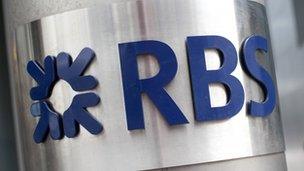FSA denies negligence over RBS
- Published
- comments

The Financial Services Authority's long-awaited report into the failure of Royal Bank of Scotland lays primary responsibility for the bank's collapse on "underlying deficiencies in RBS management, governance and culture".
The costs of the debacle have been enormous. Taxpayers had to rescue the bank by injecting £45.5bn into the bank and are currently sitting on a loss of more than £25bn on this investment.
As the chairman of the FSA, Lord Turner, points out, the crisis at RBS (and other banks) helped tip the UK into the worst recession since the 1930s.
Yet the FSA did not bring enforcement or disciplinary proceedings against the bank and its top management (although one executive agreed not to work in a risk-taking position in a bank again).
Also, although the FSA concedes that the regulation and supervision of banks was "deficient" and "flawed", these shortcomings were not negligence - Lord Turner insists - but were symptomatic of a generally inadequate approach to keeping the financial system safe.
Lord Turner says he understands it may be hard to accept that no-one has been seriously punished for the economic and fiscal damage wreaked by RBS.
He says the law may have to be changed such that board members of banks will be made more liable for the adverse consequences of their poor decisions.
Another idea would be to introduce the presumption that executive directors of banks that fail would be automatically banned from holding such positions again, unless they can prove they weren't culpable (a presumption of guilty until proven innocent).
Finally, he thinks there is a case for forcing bank directors to hold more of their pay in an escrow account, which can't be touched for years, so that if the bank were to get into difficulties the money could be taken away from them.
Update 07:30: Although the FSA says it can't take enforcement action against RBS or former directors, a footnote to the report says that the relevant papers have been passed to the Business Department, so that it can decide whether to commence proceedings to disqualify directors under the Companies Act.
Also, you may recall that there was a good deal of interest in an injunction taken out by Sir Fred Goodwin to prevent publication of details relating to his private life when chief executive of RBS.
The FSA says elliptically: "Having investigated the subject matter of the injunction, we are confident that it is irrelevant to the story of RBS's failure".
Update 09:17: The chairman of FSA Lord Turner told me in an interview just now that the EU council made only modest progress last week in solving the eurozone's crisis. The FSA is still on high alert.
On the collapse of RBS, he says the culture of light touch regulation was one underlying cause of the debacle. But he does not blame the Labour government of the time, because he says there was cross party consensus that minimising the regulatory burden was the right way to go.